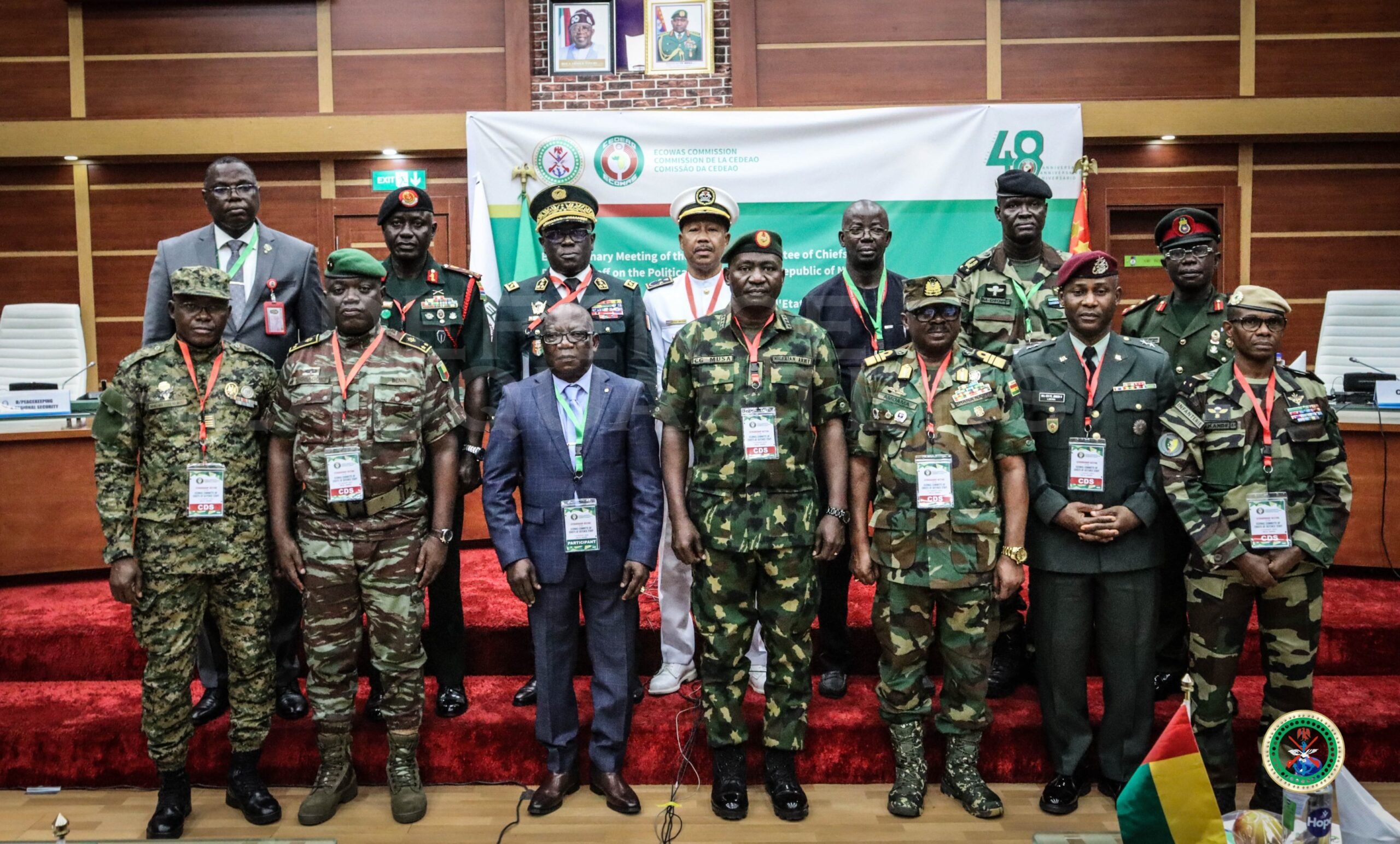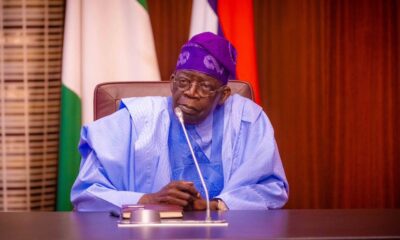Strictly Personal
Military action won’t resolve Niger crisis, By Solomon Ayele Dersso
Published
1 year agoon

No doubt, this is a major policy issue of immediate concern. But there is a more pressing aspect of the policy challenge the AU faces from the ECOWAS request for a wholesale endorsement of its decisions.
As the junta entrenches itself and gets more radical in an attempt to defy the sanctions and threat of force, and, on its part, Ecowas doubles down on its threat of force, the two are locking themselves on a dangerous path of escalation. If this is not reversed, it could degenerate into armed fighting. Such fighting is sure to frustrate the end state Ecowas seeks to accomplish through its planned military intervention — reinstating the deposed president to power, thereby reversing the coup and restoring constitutional order.
Yet the failure of the military intervention to achieve its end state would be the least consequential outcome. Unfortunately, the fighting that this intervention stands to precipitate is sure to accelerate the dangerous set of conditions set in motion that could blow up Niger, triggering calamitous consequences for the entire region and reverberating across the continent.
First, after the warning by the two other central Sahelian countries under military rule, Burkina Faso and Mali, that military measures against Niger amounts to a declaration of war against them, Ecowas’ military intervention in Niger risks to trigger regionalised war.
Second, with the announcement of the formation of a rebel movement aiming at reinstating President Bazoum to power, Niger faced the danger of internal fighting and hence the acceleration of its fragility.
Third, any military intervention that targets and weakens Niger’s army also exposes Niger to the danger of collapse. With an army battered by a fight with forces from neighbouring countries, Niger will easily be overrun by the armed terrorist groups operating in the Sahel.
Thus, the most pressing dilemma for the AU is to help Ecowas find a path for a non-military and non-punitive (for Nigerien people) resolution of the constitutional crisis in Niger and the attendant democratic setback it represents for the region.
For the West African region, the coup in Niger represented the case with the most significant regional and geostrategic implementations. It is the sixth coup to take place in the region since August 2020. Niger, one in five countries in the region is now under military rule.
However, more than any of the earlier cases, the coup in Niger sent shockwaves to many of the governments of the region. As an attack on a “democratically elected” government, it has triggered understandable concern for governments of the region that, if not reversed, no government in West Africa and beyond could remain immune from becoming a victim of a coup.
For Ecowas, which has been in the forefront of fighting coups, the occurrence of the coup in Niger puts the spotlight on the efficacy of how it handled the other coups.
It signals that the anti-coup posture and approach of Ecowas has lost all its potency and credibility – under the weight of elections with questionable credibility, prolongation of power by incumbents through tampering with constitutional provisions on term limits, erosion of civic space and worsening bad governance.
Coming not long after the ascent of Nigeria’s new president to the helm of Ecowas, the coup also came as a major foreign policy challenge for President Bola Ahmed Tinubu, who wishes to reaffirm the regional and continental leadership role of Nigeria.
When Ecowas set its first extraordinary summit after the coup, the mood on the part of political elites in West Africa was to send a strong message against the putsch in Niger for drawing a line on coups in the region. Indicating that they should have been firm in how they responded to earlier coups, Senegal President Macky Sall said “now that we are together on this, we should take action to make sure that it does not continue.”
Niger was thus slapped with the most severe regime sanctions that the regional body imposed “in the history of the region.” It closed air and land borders. It suspended financial and economic transactions with Niger.
Not surprisingly, President Tinubu’s administration took a tougher stance against the coup. In addition to the Ecowas sanctions, Nigeria cut power supply to Niger.
It is these measures that took centre stage in Ecowas effort to reverse the coup. As a follow up to the one-week ultimatum and to add pressure on the junta, on August 2-4 the Ecowas Committee of Chiefs of Defence met in Abuja to draw up a plan of military intervention.
With the space and the air sucked by the harshly punitive sanctions and the threat of military intervention, diplomacy ended up taking a very far secondary place. Indeed, the nature and scope of the sanctions and the ratcheting up of the threat of the use of force, instead of facilitating diplomacy, raised the stakes for both Niger and Ecowas.
While the sanctions exact heavy price and the threat of use of force puts Niger’s survival in peril, for Ecowas it is perceived, albeit wrongly, as a matter of its credibility per Cote d’Ivoire’s President Alassane Outtara.
Having exhausted all of its other ammunition at a go, Ecowas is left with military intervention as the only instrument of pressure. Not totally surprisingly, when the second extraordinary summit of Ecowas was convened on August 10, the regional body doubled down on its stance, including its threat to use force.
Thus, notwithstanding the admission of President Tinubu on the failure of the one-week ultimatum given to the junta, Ecowas, among others, decided to “immediately activate the Ecowas Standby Force with all its elements” and ordered, “the deployment of Ecowas Standby Force to Niger to restore constitutional order.” With all these, Ecowas has locked itself in a tight corner.
On the other hand, the harsh punitive sanctions and the use of force have given the junta the context for stirring the nationalist fervour of Nigeriens and riding on their anti-neo-colonial sentiments.
Ecowas’ position is made more difficult due to charges that it was being used to advance the interests of foreign powers in the face of the persistent diplomatic manoeuvring of France and until recently the US centred on securing the reinstatement of President Bazoum.
In the process, the junta has increasingly taken positions that are less amendable to diplomatic engagements. On August 3, a massive demonstration in support of the coup was staged. The Ecowas diplomatic delegation headed by former Nigerian President General Abdulsalami Abubakar sent on August 6, was prevented from leaving the Niamey airport and returned to Nigeria without meeting the coup leader.
On August 8, the junta declined to receive a tripartite delegation from Ecowas, AU and the UN, alleging that “anger and revolt among the population” against Ecowas’ sanctions made it impossible to guarantee the envoys’ safety. In the last few days, it was reported that the junta warned that it would kill the deposed president if military intervention is followed through.
All of the foregoing signals that Niger and Ecowas are on a war footing. The AU should rise to the occasion and mobilize robust diplomatic efforts aiming at helping Ecowas and Niger find a path that steers them clear of military intervention. This effort should include, as Joseph Sany, Vice-President of USIP rightly counselled, “avoiding military action that could worsen the crisis and shaping sanctions in ways to reduce suffering within the general population.”
The AU would fail to play a more responsible role if it took the easy option of reducing itself to rubber-stamping the decision of Ecowas despite all the risks.
Dr Solomon Ayele Dersso is the founding director of Amani Africa.
You may like
-


Alliance of Sahel States opposes ECOWAS disengagement schedule
-


Tinubu pledges to stabilize ECOWAS in the face of insecurity
-


EU withdraws Niger diplomat after junta accuses it of mismanaging aid
-


ECOWAS allocates $380m to electrify Nigerian health facilities
-


French journalist under watch by Mali, Burkina Faso, Niger juntas over jihadist analysis
-


ECOWAS President requests UNGA action on global pledges
Strictly Personal
Let’s merge EAC and Igad, By Nuur Mohamud Sheekh
Published
2 months agoon
November 27, 2024
In an era of political and economic uncertainty, global crises and diminishing donor contributions, Africa’s regional economic communities (RECs) must reimagine their approach to regional integration.
The East African Community (EAC) and the Intergovernmental Authority on Development (Igad), two critical RECs in East Africa and the Horn of Africa have an unprecedented opportunity to join forces, leveraging their respective strengths to drive sustainable peace and development and advance regional economic integration and promote the African Continental Free Trade Area (AfCFTA).
Already, four of the eight Igad member states are also members of the EAC and, with Ethiopia and Sudan showing interest, the new unified bloc would be formidable.
Igad’s strength lies in regional peacemaking, preventive diplomacy, security, and resilience, especially in a region plagued by protracted conflicts, climate challenges, and humanitarian crises. The EAC, on the other hand, has made remarkable strides in economic integration, exemplified by its Customs Union, Common Market, and ongoing efforts toward a monetary union. Combining these comparative advantages would create a formidable entity capable of addressing complex challenges holistically.
Imagine a REC that pairs Igad’s conflict resolution strengths with the EAC’s diplomatic standing and robust economic framework. Member states of both are also contributing troops to peacekeeping missions. Such a fusion would streamline efforts to create a peaceful and economically prosperous region, addressing the root causes of instability while simultaneously promoting trade investment and regional cooperation.
These strengths will be harnessed to deal with inter-state tensions that we are currently witnessing, including between Ethiopia and Somalia over the Somaliland MoU, strained relations between Djibouti and Eritrea, and the continually deteriorating relations between Eritrea and Ethiopia.
The global economy experienced as a result of the COVID-19 pandemic, compounded by the Ukraine war and competing global crises, has strained donor countries and reduced financial contributions to multilateral organisations and African RECs. Member states, many of which are grappling with fiscal constraints, are increasingly unable to fill this gap, failing to make timely contributions, which is in turn affecting key mandate areas of Igad and EAC, and staff morale.
A merger between Igad and EAC would alleviate this financial pressure by eliminating redundancies. Shared administrative systems, integrated programmes, and a unified leadership structure would optimise resources, enabling the new REC to achieve more with less. Staff rationalisation, while sensitive, is a necessary step to ensure that limited funds are channelled toward impactful initiatives rather than duplicative overheads.
The African Union (AU) envisions a fully integrated Africa, with RECs serving as the building blocks of the AfCFTA. A unified EAC-Igad entity would become a powerhouse for regional integration, unlocking economies of scale and harmonising policies across a wider geographical and economic landscape.
This merger would enhance the implementation of the AfCFTA by creating a larger, more cohesive market that attracts investment, fosters innovation, and increases competitiveness. By aligning trade policies, infrastructure projects, and regulatory frameworks, the new REC could serve as a model for others, accelerating continental integration.
The road to integration is not without obstacles. Political will, divergent institutional mandates, and the complexity of harmonising systems pose significant challenges. However, these hurdles are surmountable through inclusive dialogue, strong leadership, and a phased approach to integration.
Member states must prioritise the long-term benefits of unity over short-term political considerations. Civil society, the private sector, the youth, and international partners also have a critical role to play in advocating for and supporting this transformative initiative.
The time for EAC and Igad to join forces is now. By merging into a single REC, they would pool their strengths, optimise resources, and position themselves as a driving force for regional and continental integration. In doing so, they would not only secure a prosperous future for their citizens and member states but also advance the broader vision of an integrated and thriving Africa.
As the world grapples with crises, Africa must look inward, embracing the power of unity to achieve its potential. A combined Igad-EAC is the bold step forward that the continent needs.
Nuur Mohamud Sheekh, a diplomatic and geopolitical analyst based in London, is a former spokesperson of the Igad Executive Secretary. X: @NuursViews
Strictly Personal
Budgets, budgeting and budget financing, By Sheriffdeen A. Tella, Ph.D.
Published
2 months agoon
November 20, 2024
The budget season is here again. It is an institutional and desirable annual ritual. Revenue collection and spending at the federal, State and local government levels must be authorised and guided by law. That is what budget is all about. A document containing the estimates of projected revenues from identified sources and the proposed expenditure for different sectors in the appropriate level of government. The last two weeks have seen the delivery of budget drafts to various Houses of Assembly and the promise that the federal government would present its draft budget to the National Assembly.
Do people still look forward to the budget presentation and the contents therein? I am not sure. Citizens have realised that these days, governments often spend money without reference to the approved budget. A governor can just wake up and direct that a police station be built in a location. With no allocation in the budget, the station will be completed in three months. The President can direct from his bathroom that 72 trailers of maize be distributed to the 36 states as palliatives. No budget provision, and no discussion by relevant committee or group.
We still operate with the military mentality. We operated too long under the military and of the five Presidents we have in this democracy, two of them were retired military Heads of State. Between them, they spent 16 years of 25 years of democratic governance. Hopefully, we are done with them physically but not mentally. Most present governors grew up largely under military regimes with the command system. That is why some see themselves as emperor and act accordingly. Their direct staff and commissioners are “Yes” men and women. There is need for disorientation.
The importance of budget in the art of governance cannot be overemphasized. It is one of the major functions of the legislature because without the consideration and authorisation of spending of funds by this arm of government, the executive has no power to start spending money. There is what we refer to as a budget cycle or stages. The budget drafting stage within the purview of the executive arm is the first stage and, followed by the authorisation stage where the legislature discusses, evaluates and tinkers with the draft for approval before presenting it to the President for his signature.
Thereafter, the budget enters the execution phase or cycle where programmes and projects are executed by the executive arm with the legislature carrying out oversight functions. Finally, we enter the auditing phase when the federal and State Auditors verify and report on the execution of the budgets. The report would normally be submitted to the Legislature. Many Auditor Generals have fallen victim at this stage for daring to query the executives on some aspects of the execution in their reports.
A new budget should contain the objectives and achievements of the preceding budget in the introduction as the foundation for the budget. More appropriately, a current budget derives its strength from a medium-term framework which also derives its strength from a national Development Plan or a State Plan. An approved National Plan does not exist currently, although the Plan launched by the Muhammadu Buhari administration is in the cooler. President Tinubu, who is acclaimed to be the architect of the Lagos State long-term Plan seems curiously, disillusioned with a national Plan.
Some States like Oyo and Kaduna, have long-term Plans that serve as the source of their annual budgets. Economists and policymakers see development plans as instruments of salvation for developing countries. Mike Obadan, the former Director General of the moribund Nigeria Centre for Economic and Management Administration, opined that a Plan in a developing country serves as an instrument to eradicate poverty, achieve high rates of economic growth and promote economic and social development.
The Nigerian development plans were on course until the adoption of the World Bank/IMF-inspired Structural Adjustment Programme in 1986 when the country and others that adopted the programme were forced to abandon such plan for short-term stabilisation policies in the name of a rolling plan. We have been rolling in the mud since that time. One is not surprised that the Tinubu administration is not looking at the Buhari Development Plan since the government is World Bank/IMF compliant. It was in the news last week that our President is an American asset and by extension, Nigeria’s policies must be defined by America which controls the Bretton Woods institutions.
A national Plan allows the citizens to monitor quantitatively, the projects and programmes being executed or to be executed by the government through the budgeting procedure. It is part of the definitive measures of transparency and accountability which most Nigerian governments do not cherish. So, you cannot pin your government down to anything.
Budgets these days hardly contain budget performance in terms of revenue, expenditure and other achievements like several schools, hospitals, small-scale enterprises, etc, that the government got involved in successfully and partially. These are the foundation for a new budget like items brought forward in accounting documents. The new budget should state the new reforms or transformations that would be taking place. Reforms like shifting from dominance of recurrent expenditure to capital expenditure; moving from the provision of basic needs programmes to industrialisation, and from reliance on foreign loans to dependence on domestic fund mobilisation for executing the budget.
That brings us to the issue of budget deficit and borrowing. When an economy is in recession, expansionary fiscal policy is recommended. That is, the government will need to spend more than it receives to pump prime the economy. If this is taken, Nigeria has always had a deficit budget, implying that we are always in economic recession. The fact is that even when we had a surplus in our balance of payment that made it possible to pay off our debts, we still had a deficit budget. We are so used to borrowing at the national level that stopping it will look like the collapse of the Nigerian state. The States have also followed the trend. Ordinarily, since States are largely dependent on the federal government for funds, they should promote balanced budget.
The States are like a schoolboy who depends on his parents for school fees and feeding allowance but goes about borrowing from classmates. Definitely, it is the parents that will surely pay the debt. The debt forgiveness mentality plays a major role in the process. Having enjoyed debt forgiveness in the past, the federal government is always in the credit market and does not caution the State governments in participating in the market. Our Presidents don’t feel ashamed when they are begging for debt forgiveness in international forum where issues on global development are being discussed. Not less than twice I have watched the countenance of some Presidents, even from Africa, while they looked at our president with disdain when issues of debt forgiveness for African countries was raised.
In most cases, the government, both at the federal and state cannot show the product of loans, except those lent by institutions like the World Bank or African Development Bank for specific projects which are monitored by the lending institutions. In other cases, the loans are stolen and transferred abroad while we are paying the loans. In some other cases, the loans are diverted to projects other than what the proposal stated. There was a case of loans obtained based on establishing an international car park in the border of the State but diverted to finance the election of a politician in the State. The politician eventually lost the election but the citizens of the State have to be taxed to pay the loan. Somebody as “Nigeria we hail thee”.
Transformation in budgeting should commence subsequently at the State and federal level. Now that local government will enjoy some financial autonomy and therefore budgeting process, they should be legally barred from contracting foreign loans. They have no business participating in the market. They should promote balanced budget where proposed expenditures must equal the expected revenues from federal and internal sources. The State government that cannot mobilise, from records, up to 40 percent of its total budget from IGR should not be supported to contract foreign loans. The States should engage in a balanced budget. The federal government budget should shift away from huge allocations to recurrent expenditure towards capital expenditure for capital formation and within the context of a welfarist state.
Sheriffdeen A. Tella, Ph.D.
EDITOR’S PICK


Nigeria: Marketers predict further price cut as another refinery begins operations
Oil marketers and the Nigerian Midstream and Downstream Petroleum Regulatory Authority expect refined petroleum product prices to reduce as another...


Kenya: Consumer inflation rises to 3.0% from 2.8%
Kenya’s statistics agency said on Tuesday that Kenya’s consumer price inflation increased slightly to 3.0% year-over-year in December from 2.8%...


South Africa’s Transnet’s half-year deficit hits $117m
Transnet, a state-owned logistics company in South Africa, announced on Tuesday that it had lost 2.2 billion rand ($117.48 million)...


Nigeria, China extend $2bn currency swap deal
A 15 billion yuan ($2 billion) currency-swap arrangement between China and Nigeria has been extended to boost investment and commerce...


Egypt’s central bank maintains overnight rates
As anticipated, Egypt’s central bank has maintained its overnight interest rates, stating that although inflation was predicted to drop significantly...


Illicit flows cost Nigeria, others $1.6bn daily— AfDB
According to the African Development Bank (AfDB), illicit money flows and profit shifting by multinational corporations doing business in Africa...


‘Don’t start what you can’t finish’, ex-Nigerian official replies President Tchiani
Former Nigerian Aviation Minister, Femi Fani-Kayode, has told President Abdourahamane Tchiani of Niger Republic to refrain from making infantile and...


Again, Starlink raises prices of its services in Nigeria
Elon Musk’s satellite internet service provider, Starlink, has again jacked up the prices of its services in Nigeria after an...


Former President of Moroccan club Raja sentenced to 3 years in prison
The former President of Moroccan top club, Raja Casablanca, Mohamed Aouzal, has been sentenced to three and a half years...


Zambia announces second case of Mpox as country battles cholera outbreak
The Zambian Ministry of Health has reported a second case of Monkeypox, popularly known as Mpox, in Kitwe region of...


